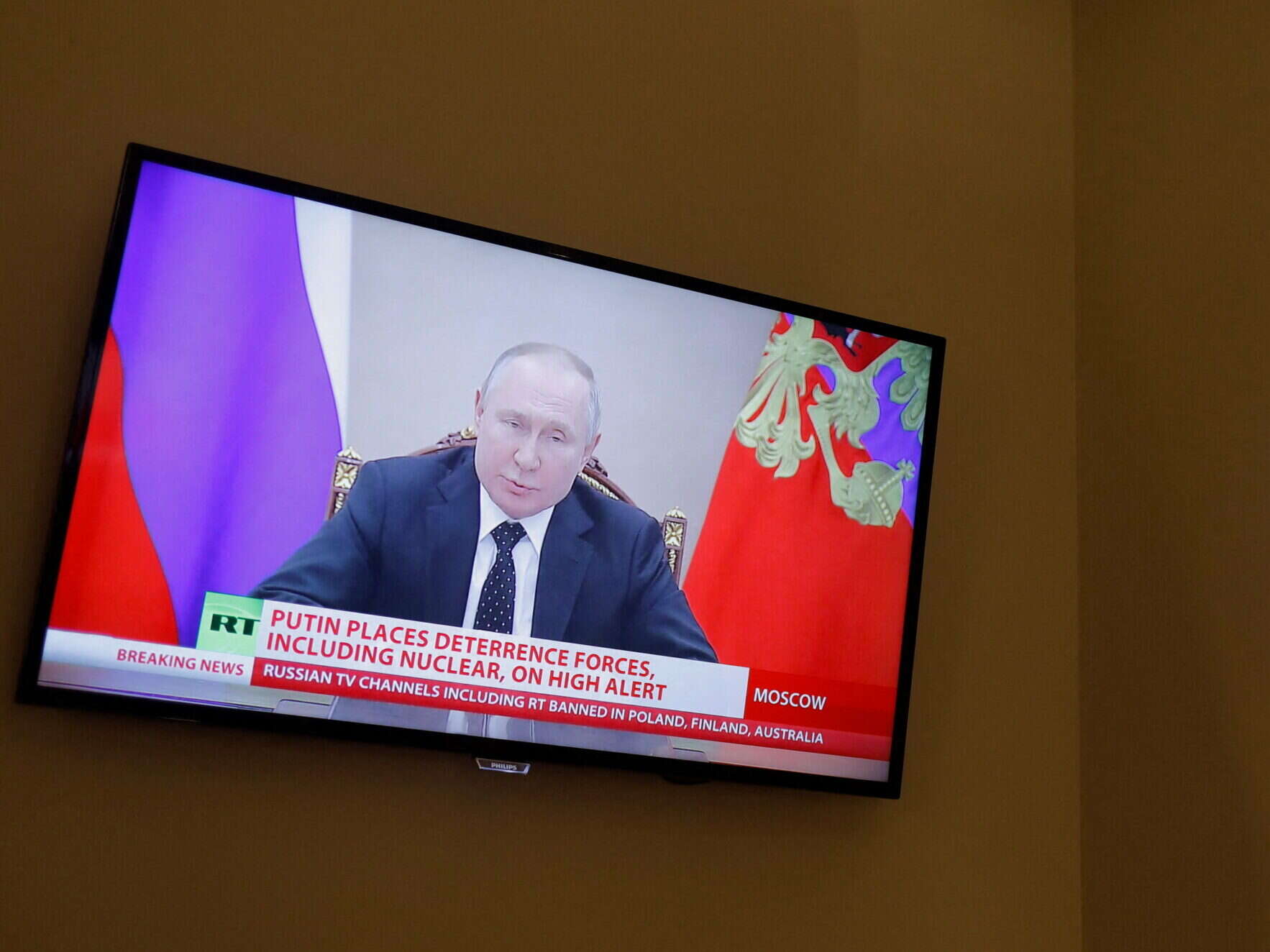
The Russian government has added more than a dozen journalists and media executives to its list of individuals banned from entering the country.
All of the newly-added media names are associated with either the BBC, Guardian News and Media or the Daily Telegraph.
The Russian foreign ministry said it was responding to “the aggressive anti-Russia policy pursued by Ldaondon” and that “work on expanding Russia’s blacklist in response to Britain’s actions is ongoing”.
The 13 new additions join a group already including the likes of Guardian editor Kath Viner, Daily Mail editor Ted Verity, BBC director-general Tim Davie, and presenters Piers Morgan and Huw Edwards.
[From August last year: Russia declares war on UK journalists – 41 leading editors and reporters sanctioned]
The foreign ministry referred to the newly-banned group of journalists as “Russophobia-charged officials and correspondents” publishing “propaganda support for the Zelensky regime”.
They include BBC News chief executive Deborah Turness, analysis editor Ros Atkins, disinformation correspondent Marianna Spring and two journalists working in the corporation’s new “BBC Verify” effort.
In The Guardian group are the newsbrand’s world affairs editor Julian Borger, chief reporter Daniel Boffey, columnist Emily Bell and both GNM’s chairperson and its chief financial and operating officer.
The three Telegraph journalists added, Colin Freeman, Francis Dearnley and David Knowles, all work on the publisher’s “Ukraine: the latest” podcast.
Dearnley, The Telegraph’s assistant comment editor, said on Twitter he was “proud” to have been sanctioned.
Also appearing on Friday’s list was Culture Secretary Lucy Frazer, who the Russian government said “actively lobbies to bar Russian athletes from international sports”.
The Russian government said the journalists added were “implicated in fabricating fraudulent anti-Russia stories to be promoted in the media and in spreading false information about our country as they are trying to prevent and cut short attempts at impartial coverage of the developments in Ukraine and to exclude signs of dissent by using methods described by George Orwell in his novels 1984 and Animal Farm”.
Asked by Semafor editor Ben Smith about his reaction to finding out he’d been banned, The Guardian’s Borger said: “I felt a surge of pride at first, imagining my writing had unsettled the Kremlin, but when I saw the full list of names it looked more like they had been chosen almost at random, either by an algorithm or an intern in a hurry.”
Indeed, one name on the list is The Telegraph’s chief people officer Mark Musgrave. The list also includes a “Keith Freeman” – apparently a misspelling of Colin Freeman’s name. The only article on telegraph.co.uk under the Keith Freeman byline is headlined “‘The UK’s patient zero was one of my hotel guests'” and was written by the chief operating officer of a network of short-stay apartments.
Full list of journalists and media executives newly banned from Russia:
- BBC News chief executive Deborah Turness
- BBC News disinformation correspondent Marianna Spring
- BBC analysis editor Ros Atkins
- BBC Verify data and investigative journalist Daniele Palumbo
- BBC Verify journalist Jake Horton
- Guardian News and Media chair Charles Gurassa
- Guardian chief financial and operating officer Keith Underwood
- Guardian columnist and Tow Center professor Emily Bell
- Guardian world affairs editor Julian Borger
- Guardian chief reporter Daniel Boffey
- Telegraph head of audio development and Ukraine podcast presenter David Knowles
- Telegraph chief people officer Mark Musgrave
- Telegraph assistant comment editor Francis Dearnley
- Former Sunday Telegraph chief foreign correspondent Colin Freeman
The previous list as published on Press Gazette is as follows:
- Shaun Walker: Correspondent, The Guardian
- Con Coughlin: Columnist for the Daily Telegraph
- Stuart Ramsay: Chief correspondent, Sky News
- James Rothwell: Journalist for the Daily Telegraph
- John Witherow: Editor-in-chief, The Times
- Chris Evans: Editor-in-chief of the Daily Telegraph
- Richard Sharp: Chairman of the Board of Governors, BBC
- Tim Davie: Director general and editor in chief, BBC
- Kath Viner: Editor-in-chief, The Guardian
- Clive Myrie: Presenter and foreign correspondent, BBC
- Orla Guerin: Foreign correspondent, BBC
- Nick Robinson: Today presenter, BBC
- Paul Adams: Diplomatic correspondent, BBC
- Nick Beake: Europe correspondent, BBC
- Alex Thomson: Chief correspondent, Channel 4 News
- Dan Rivers: Correspondent, ITV News
- Peter Beaumont: Reporter, The Guardian
- Emma Graham-Harrison: Reporter, The Guardian
- Sophy Ridge: Journalist and host, Sky News
- Cathy Newman: Journalist and host, Channel 4 News
- Ted Verity: Editor-in-chief, Daily Mail
- Christian Broughton: MD, The Independent
- Larisa Brown: Defence editor, The Times
- Mark Galeotti: Political scientist and freelance journalist
- Joe Barnes: Brussels correspondent, Daily Telegraph
- Gideon Rachman: Columnist for the Financial Times
- Luke Harding: Foreign correspondent, The Guardian
- Dominic Lawson: Columnist for The Sunday Times and Daily Mail
- Lawrence Freedman: Columnist for The Sunday Times
- David Aaronovitch: columnist for The Times
- Dan Sabbagh: Defence and security editor for The Guardian
- James Crisp: Europe editor for The Daily Telegraph
- David G Rose: Freelance
- Caroline Wheeler: Political editor for The Sunday Times
- John Ryley: Head of Sky News
- Jonathon Munro: Head of BBC News
- Edward Carr: Deputy editor of The Economist
- Jerome Starkey: Defence and Ukraine correspondent for The Sun
- Robert Peston: Political editor for ITV News
- Piers Morgan: Presenter at TalkTV
- Huw Edwards: Presenter for BBC News at Ten.
Email pged@pressgazette.co.uk to point out mistakes, provide story tips or send in a letter for publication on our "Letters Page" blog
